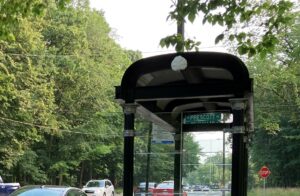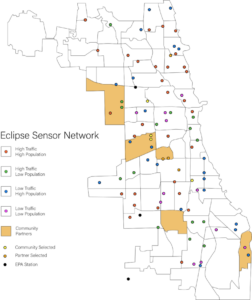Air Quality Monitoring in McKinley Park, Chicago
October 20, 2021
Connecting Technology with Community Expertise to Understand Air Quality
ELPC’s Tiffany Werner joined a Microsoft Research panel discussion with public health, technology, and science experts to discuss our new partnership for cleaner air in Chicago
Air pollution is a pervasive, but often invisible, problem in Chicago. Technology can help illuminate the unseen and offer tools to tackle it. ELPC is partnering with the Urban Innovation team at Microsoft Research and other partners to deploy “the largest real-time, hyperlocal air quality sensing network in a North American city.” The team has installed a network of air sensors on bus stops across the city, which feed air data into a map-based online portal. This project will complement ELPC’s mobile monitoring efforts and can help local residents, scientists, and advocates identify pollution hot-spots and opportunities for change. ELPC’s Tiffany Werner joined public health, technology, and science experts on a panel discussion today about this project. Here are some highlights:
Filling the gaps

New air monitor on a bus stop in Chicago
ELPC and our partners have been educating communities about what is in the air around them through outreach, data collection, and advocacy for a few years now. We conduct mobile monitoring to get a better understanding of street-by-street particulate matter concentrations and one’s personal exposure as you move throughout your neighborhood. This brings invaluable awareness to our participants, but it creates a data set that is limited. To have enough actionable data through mobile monitoring to push for better policy, we would have to overextend and exhaust our volunteers and community partners.
The gap has been in collecting data in a way that is directly comparable to the EPA, in both sampling scale and quality. I see this new sensor network that Microsoft Research is deploying as a great way to help address that. We are now finally able to have 24-hour samples across most of the city, which is huge! Before, we were asking “is air quality poor on the west side?” and we would gather data in areas of concern that highlighted what we were asking. But now we can shift our question too “is air WORSE on the west side?” We can directly compare data to other areas in the city, and we’ll have enough data to highlight trends overtime.
Centering environmental justice communities

Network of stationary sensors across Chicago. Community partners include Englewood’s Blacks in Green, Austin’s BUILD Inc, Marshall Square’s Latinos Progresando, Little Villate Environmental Justice Organization, McKinley Park’s Neighbors 4 Environmental Justice, and the Southeast Side Environmental Task Force.
Chicago has dynamic community groups and leaders who have been incredibly vocal in air quality and environmental justice issues. When I heard about this project, I was excited and thought it sounded like something that could really be beneficial, but I noticed a lack of community voices at the table. So, I wanted to make sure they were included in the work.
You can’t have a project that aims to address air quality disparities without involving those who are most affected, otherwise you end up with a dataset that could potentially be missing out on some of the biggest hot spot areas. Or you get a data set and tools that aren’t as useful to the communities who need them and would utilize them the most.
Some of the EJ communities who experience air quality issues have also unfortunately been some of the areas hardest hit by Covid-19 and Covid-related deaths. It was crucial for us to not continue to take the expertise of our community leaders without pouring back into the community somehow. So, I was so excited about the mini grant opportunities which allowed us to compensate groups for their time, and while the grants weren’t much it’s a start to show we value their voices. Its overdue and deserved. Moving forward there needs to be more funding and compensation and shared resource opportunities for our partners.
Looking ahead
It’s a massive undertaking to build new infrastructure like this throughout the city, but we’re really looking forward to how the infrastructure can help us create real change. Our communities deserve us to really investigate air quality issues and disparities and policies that can protect public health, especially for those who are vulnerable and most at risk. This infrastructure is a huge first step and I look forward to continuing to work on this. Clean air is a human right.


